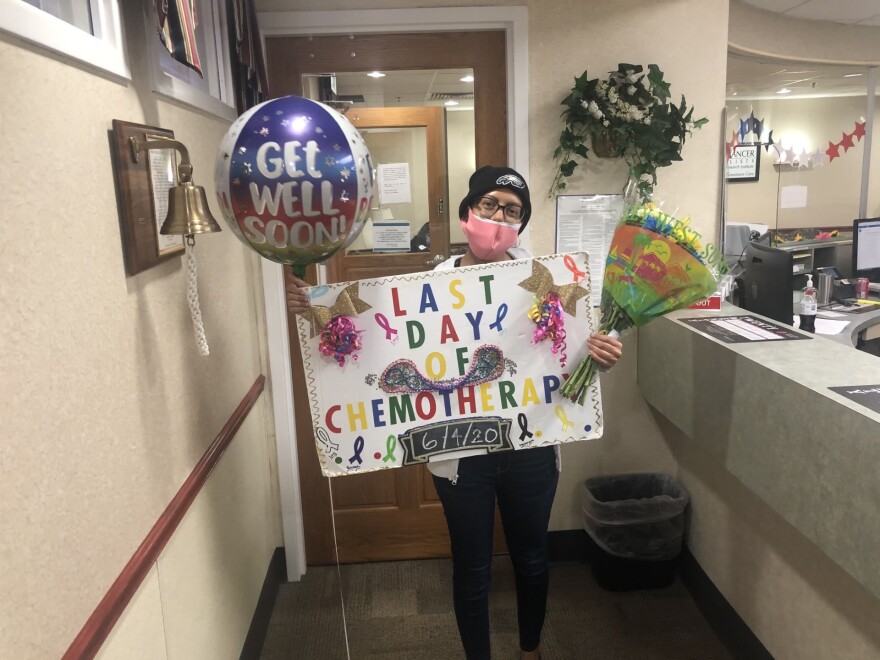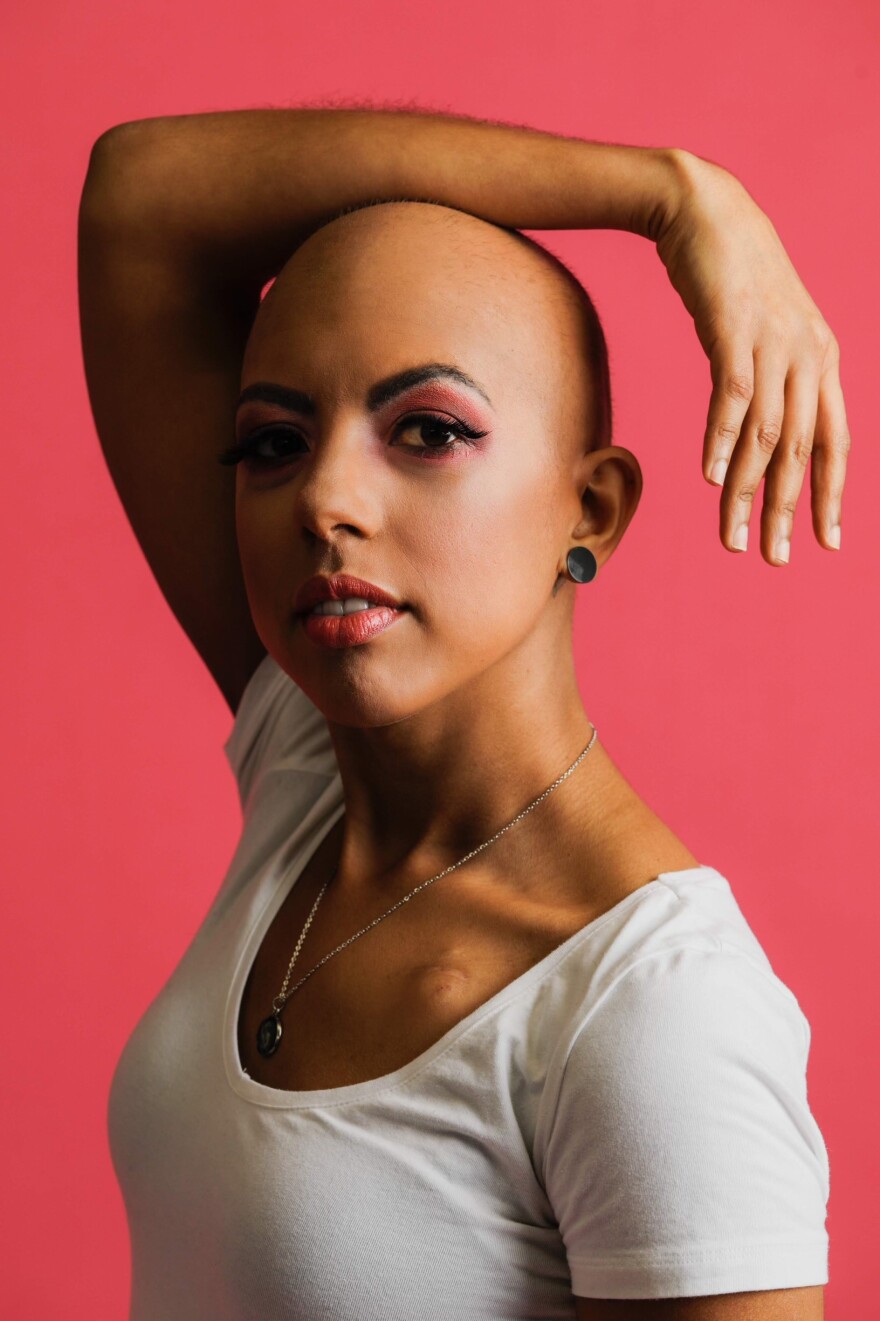Vanessa De La Rosa Martinez was 29 when she was first diagnosed with breast cancer. She had no family history. She didn't smoke or drink excessively.
“It was surprising because I'm not out there. I was living basically the average life of an American person,” she said.
Martinez is but one example of a trend doctors are seeing: cancer diagnoses in younger demographics of women. A study released earlier this year by the JAMA Network found between 2010 and 2019, about 63% of cancer patients were women with early-onset cancer — breast cancer being the most common diagnosis.
Younger patients
In 2019, Martinez first noticed a cyst. It was growing abnormally fast. She had a biopsy performed. It came back positive for stage 3 breast cancer.

"I broke down into tears," she said. "My first thought was, oh, my God, I'm going to do chemo, and I was very, very surprised and shocked, thinking about losing my hair and the picture of chemotherapy."
Martinez's story isn't a rarity according to Dr. Amber Orman, an oncologist at AdventHealth in Central Florida.
"My whole career has focused on breast cancer, and the number of patients that are in there, sometimes 20s, but certainly, their 30s and 40s, does seem to be increasing," said Dr. Amber Orman, an oncologist at AdventHealth in Central Florida. "When it came out that in the U.S. we have increasing cancer cases in people under 50 specifically an increase in females with breast cancer being the most prevalent cancer, I wasn't honestly surprised."
Poor nutrition and the perfect, cancerous storm
The JAMA Network study didn't reveal answers as to why cancer is becoming more common in patients younger than 50 (50 to 70-year-olds are still one of the biggest risk groups) but it did offer a possible explanation: poor nutrition and obesity.
"Two-thirds of our population is qualified as overweight or obese. And that's a staggering number," she said. "That, in and of itself, is a source of inflammation for the body."
Obesity leads to body inflammation, which in turn leads to chronic diseases like cancer.
In Martinez’s case. She wasn’t obese but she didn’t exactly eat healthy, either.
"I would still eat a lot of processed foods. A lot of cheese, a lot of dairy a lot of things that could possibly harm me in terms of hormones," she said.
Her breast cancer tested hormone positive. Dr. Orman said nutrition plays a big part in cancer development.
“While 5% to maybe 10% of cancers have a genetic component. The rest are related to a million things that have happened over the course of your life," Orman said. And it has to do with your entire lifestyle."
Nutrition, sleep, relationships, and environmental exposures culminate into a perfect, cancerous storm, she said.
The HEAL program
Nutrition itself has been a favorite topic of Orman's since she was a child and lived a on farm in Indiana. She pursued the subject further in med school, even though it wasn't required reading. She taught herself anyway as a means to fuel her study efficiency.
"I wanted to know how can I optimize my performance in my education, and carry that on into medical school," she said.
Now in her oncology practice, Orman is taking that mentality of optimizing and applying it to treatment. Orman combines nutrition strategy with traditional treatments — radiation and chemotherapy — in a program she developed called HEAL– Healthy Eating and Active Lifestyle.
"We're treating your cancer with radiation, but also how can we optimize the way that you're living so that we really move the needle on your outcomes beyond that of our traditional treatments?" she said.

HEAL is an eight-week, interactive virtual program that helps patients focus on plant-based nutrition, yoga, and mindfulness to elevate their cancer treatment.
HEAL teaches patients about the body’s gut microbiome — a group of bacteria that assists the immune system. Orman advises patients on how a predominately plant-based diet can help the gut bacteria.
"This results in better function of your immune system, and lower global inflammation in your body," Orman said.
A plant-based diet can reduce the risk of cancer recurrence by 30% to 50% and the risk of death by 50%, according to Orman. The National Library of Medicine and the American Society of Clinical Oncology both have studies with similar findings. The HEAL program also teaches yoga, physical exercise, and how grief counseling releases supportive endorphins to improve the immune system.
Confidence after cancer
Martinez was one of the first graduates of Orman’s HEAL program. She’s made huge lifestyle changes including the incorporation of a largely plant-based diet. Her favorite is a quinoa, spinach, and kale bowl.
"With like bulgogi sauce and some carrots and like just like a bunch of veggies and that's like super cool, super delicious," Martinez said
It'll be three years in November since Martinez completed her radiation treatment, but she's been cancer-free since July 2020. Martinez feels healthier now than before her diagnosis and said she doesn’t live in fear of her cancer’s possible return.
"I'm confident that I'm doing everything I can to make sure it doesn't," she said.
Experts say women between the ages of 50 to 74 should receive a mammogram every one to two years. Women 40 to 49 should talk to their doctor about when to start mammograms.
Orman's HEAL program is open to all cancer patients, not just those being treated at AdventHealth. If you're interested in learning more or registering you can reach out to HEAL at this link.






